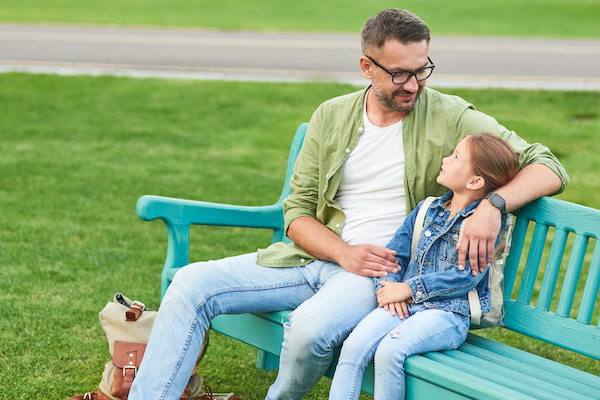Talking with Children About Cancer
Open Communication Has Never Been More Important
by Paula K. Rauch, MD
Our children and adolescents are growing up in a stressful, complicated world. They are living through an evolving pandemic, politics that divide us, climate change alarm, and local and global violence. It is understandable that parents may want to “protect” their children from difficult news about a cancer diagnosis and treatment, but there has never been a time when open communication is more important for child and adolescent emotional health and well-being. Your cancer diagnosis and treatment are an opportunity, albeit an unwelcome one, to model how to face challenges together with sensitivity and open communication. When life is hard and confusing, you want your child to look to you and other key caring adults in their lives as trusted guides through difficult times.
Parents should begin the dialogue early by letting children know about the cancer diagnosis. Children are likely to be more worried and mistrustful if they overhear the news or later learn that they were misled by their parents early on. Start the conversation by calling the cancer by name and giving a simple explanation of what cancer is. By naming the cancer (saying breast cancer or colon cancer, not lump or “boo-boo”), you give your child a key tool for maintaining an open dialogue.
Children also need to be prepared for any changes in their routines and schedules. They will need to know who will be picking them up from school, making dinner, and putting them to bed at night. It is especially important during the early days of diagnosis and treatment when life is most unsettled that children feel the security that comes from knowing their parents are planning for their care.
Parents should identify the settings in which they most commonly have meaningful conversations with their children.
As treatment gets underway, parents should check in with each child periodically and ask for feedback on how they are handling the new challenges and changes. You may consider making adjustments to schedules and routines based on the child’s or teen’s input. It’s important to remember that even when children are not asking questions, parents should continue to provide simple updates to ensure that news is not learned (or misunderstood) through overhearing adult conversations.
For some children, generalized stress may make routine activities, such as homework, more burdensome. It is essential to acknowledge your child’s disappointment or distress. Likewise, it is important that children not feel alone with their worries or selfish for feeling unhappy about the changes in their lives that result from cancer. Empathize with them and seek reasonable alternatives where possible.
Learning to listen well is a crucial component of good communication during a stressful time. It is essential for empathizing with the child’s experience. When children and teenagers can feel that a parent is interested in their viewpoints and respects what they have to say, they are far more likely to open up and share their thoughts.
However, finding the right time for these open conversations is hard. Some children seek out opportunities to ask questions and share their thoughts, while others tend to be less vocal. Parents should identify the settings in which they most commonly have meaningful conversations with their children. These might be in the kitchen during meal preparation, in the car on the way to school, or at bedtime. Pinpointing these particular settings allows parents to prioritize spending these important times together with their children amid the pressures of a hectic schedule during cancer treatment.
Maintaining a parenting style that welcomes conversations of all sorts is ideal. Children can be encouraged to ask questions about any topic, not just cancer. Parents should let children know they find their questions interesting and worthy of consideration. In addition, parents can ask a child to share more about his or her question. Often, in the process of elaborating on a question, an underlying worry, misconception, or unexpected perspective becomes clearer. Questions need not be answered immediately. In fact, it can suggest respect for a child’s question when parents say they want to think more about the question and maybe even get more input from another person or resource.
A cancer diagnosis is challenging for every member of the family. For parents, the well-being of their children often tops their list of priorities and is a source of ongoing worries. Parents living with cancer have a real opportunity to support their children through this time in ways that build long-term emotional skills and coping capacities while at the same time modeling important family values.

Dr. Paula Rauch is director of the Marjorie E. Korff Parenting At a Challenging Time (PACT) Program at Massachusetts General Hospital Cancer Center in Boston, MA, and the author of Raising an Emotionally Healthy Child When a Parent Is Sick.
For more information about the PACT program and for resources on parenting during cancer, visit mghpact.org.
This article was published in Coping® with Cancer magazine, May/June 2022.


